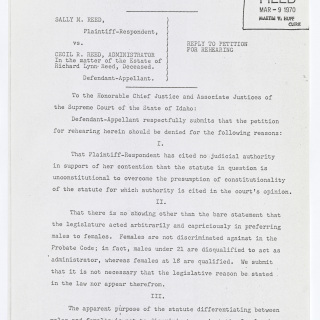Victory Against Gender Discrimination 1971
In 1967, Sally Reed was denied the role of executor to her late son’s estate because she was female. Her ex-husband became executor because under Idaho law “males must be preferred to females” if candidates are equally qualified. Thinking this law unjust, Sally Reed appealed the decision.
The U.S. Supreme Court in ‘Reed’ v. ‘Reed’ sided unanimously with Sally Reed by striking down Idaho’s law and declaring that gender preference violates the 14th Amendment guarantee to “equal protection of the laws.” Rejecting the state’s argument that the law is practical and simplifies executor appointments, the Supreme Court deemed it discriminatory against women. The Reed decision established heightened scrutiny of laws that assume separate roles for men and women.
